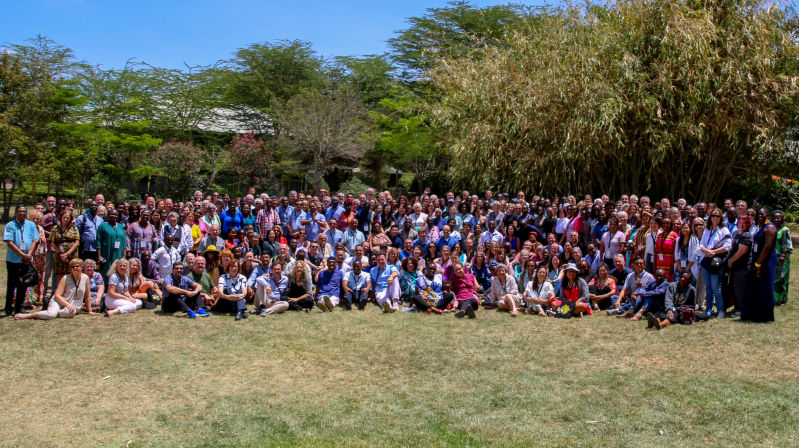
The 4th Global Member Care Network conference held in Maanzoni, 35 kilometers outside of Nairobi, Kenya, gathered over 350 participants including 80 speakers from around the world to deliberate and learn how missionaries and their families can be supported to do effective and impactful work in the mission field.
The conference, which was held on 29th October to 1st November, 2024, brought together participants from 48 countries spread across 6 continents. Africa, Asia and Latin America had 135, 31 and 23 representatives while 114 were from North America, 45 from Europe and 12 from Australia and New Zealand. The participants were drawn from church and para-church organizations, community based organizations, counselling professional and individual registrations.
The workshops and plenary sessions centered on highlighting and coping with spiritual, psycho-social, financial and cultural challenges that missionaries face. Harry Hoffman, the coordinator of the Global member Care Network and convenor of the conference told Christian Daily International that missionaries face unique challenges that are often not understood or not addressed adequately.
He explained that missionaries - a majority who live and work in cross cultural environments - are exposed to drastic transitions which can lead to stress and burnout.
“They work in international teams so there are language problems, coping with cultural differences (of the host communities), and raising their children in the mission field. So member care is about missionary care which focuses on the emotional, relational and spiritual well-being of workers,” said Hoffman.
He added that a critical aspect of member care is providing support to the children of missionaries who are impacted by the physical and cultural differences of new environments. Hoffman shared an example of one of the participants of the conference who missed years of school because his parents were missionaries in Northern Kenya where schools were not easily accessible. He later founded the African Missionary Kids Ministry to offer spiritual, social and educational support to children of missionaries.
The conference, whose theme was ‘Caring for the Harvest Force’, provided a platform for members to learn from each other and create network partnerships. Hoffman explained that more mature and developed member care networks such as Nigeria, Korea could provide their experience to growing countries such as China, Indonesia, Ethiopia and Burundi.
In addition to country-specific member care lessons, participants learnt that they could plug in into region wide network missions networks. In Latin America, COMIBAM focuses on co-ordinating mission initiatives in the region as well as providing care to missionaries. The Movement for African National Initiatives (MANI), Member Care Europe, Indian Missions Alliance and and the South Pacific Member Network provide support and resources to missionaries in the respective regions.
Hoffman said that the conference allows members “to learn from one another what culturally contextualized care means.”
“In Latin America or Africa, it means you have very strong family and social connections. So what do you need socially to thrive as a missionary? What do you need when you live in the bush or when you move to Saudi Arabia? Through collaboration, they are interested in making sure the missionaries are well cared for because training up missionaries takes a lot of time and also costs money,” said Hoffman.
There were also sessions that looked into the cultural and biblical perspective of suffering and to handle suffering in different contexts. Participants also got to join sessions in crisis and trauma, skills and training, rest and sabbatical for missionaries, inner healing and forgiveness and working in multicultural teams. There were also panel discussions and workshops on finances, counselling children, strengthening Mission Marriages and caring for Singles in Missions.
By connecting people with similar interests, the conference provided an opportunity for participants to network and share experiences and approaches with each other, said Hoffman.
A participant who provided anonymous feedback days after the conference said GMCN catalyzed 38 attendees from Kenya, Ethiopia, Tanzania and Uganda to create an East African Member Care practitioners group.
“Pray with us as we seek to come together to help and strengthen each other on this journey. Thanks for the opportunity to meet,” said the participant.
“Thank you for choosing such good speakers who are passionate about what they are doing. It is truly a divinely inspired occasion that brought such a diverse group of people together all on the same path to provide meaningful care and support for those who serve. God bless you all! Already looking forward to the next one!” said another participant.
Held every 3 years, the GMCN conference was last hosted in Quito, Ecuador which helped a lot of missionaries in the Spanish speaking Latin American community to develop care structures and systems. Hoffman said the member care structures in Brazil are advanced, so to see young movements in Chile, Bolivia, Colombia and Argentina expanding is a testament to the impact of hosting the conferences in different regions.
“The idea is to bring the globe to one continent, to one region to help stimulate member care developments in Africa here, but also to learn from Africa because Africans are now everywhere on the mission field around the world and in many organizations,” said Hoffman.





